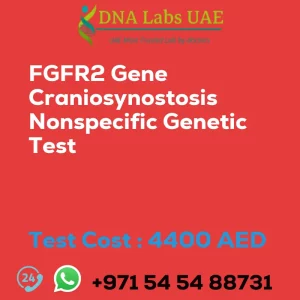FOXH1 Gene Congenital Heart Disease and Transposition of the Great Arteries Genetic Test
Cost: AED 4400.0
Test Components:
- Price: AED 4400.0
- Sample Condition: Blood or Extracted DNA or One drop Blood on FTA Card
- Report Delivery: 3 to 4 Weeks
- Method: NGS Technology
- Test Type: Dysmorphology
- Doctor: Pediatrics
- Test Department: Genetics
Pre Test Information:
Clinical History of Patient who is going for FOXH1 Gene Congenital heart disease and transposition of the great arteries NGS Genetic DNA Test. A Genetic Counselling session to draw a pedigree chart of family members affected with FOXH1 Gene Congenital heart disease and transposition of the great arteries NGS Genetic DNA Test gene FOXH1.
Test Details:
The FOXH1 gene is a transcription factor that plays a crucial role in the development of various organs, including the heart. Mutations in the FOXH1 gene have been associated with congenital heart disease, including transposition of the great arteries (TGA). Congenital heart disease refers to structural abnormalities in the heart that are present at birth. TGA is a specific type of congenital heart defect where the two main arteries leaving the heart, the pulmonary artery and the aorta, are switched in position. This results in oxygen-poor blood being circulated to the body instead of being pumped to the lungs for oxygenation.
Next-generation sequencing (NGS) genetic testing is a powerful tool used to identify genetic variations and mutations associated with various diseases, including congenital heart disease. It allows for the simultaneous analysis of multiple genes, providing a comprehensive view of the genetic factors contributing to the disease. NGS genetic testing can help identify specific mutations in the FOXH1 gene that may be causing congenital heart disease, including TGA. This information can be used for accurate diagnosis, prognosis, and potentially for personalized treatment approaches.
It is important to note that genetic testing should be performed by a qualified healthcare professional who specializes in genetics. They will be able to interpret the results and provide appropriate counseling and guidance based on the individual’s specific genetic profile and medical history.
| Test Name | FOXH1 Gene Congenital heart disease and transposition of the great arteries Genetic Test |
|---|---|
| Components | |
| Price | 4400.0 AED |
| Sample Condition | Blood or Extracted DNA or One drop Blood on FTA Card |
| Report Delivery | 3 to 4 Weeks |
| Method | NGS Technology |
| Test type | Dysmorphology |
| Doctor | Pediatrics |
| Test Department: | Genetics |
| Pre Test Information | Clinical History of Patient who is going for FOXH1 Gene Congenital heart disease and transposition of the great arteries NGS Genetic DNA Test. A Genetic Counselling session to draw a pedigree chart of family members affected with FOXH1 Gene Congenital heart disease and transposition of the great arteries NGS Genetic DNA Test gene FOXH1 |
| Test Details |
The FOXH1 gene is a transcription factor that plays a crucial role in the development of various organs, including the heart. Mutations in the FOXH1 gene have been associated with congenital heart disease, including transposition of the great arteries (TGA). Congenital heart disease refers to structural abnormalities in the heart that are present at birth. TGA is a specific type of congenital heart defect where the two main arteries leaving the heart, the pulmonary artery and the aorta, are switched in position. This results in oxygen-poor blood being circulated to the body instead of being pumped to the lungs for oxygenation. Next-generation sequencing (NGS) genetic testing is a powerful tool used to identify genetic variations and mutations associated with various diseases, including congenital heart disease. It allows for the simultaneous analysis of multiple genes, providing a comprehensive view of the genetic factors contributing to the disease. NGS genetic testing can help identify specific mutations in the FOXH1 gene that may be causing congenital heart disease, including TGA. This information can be used for accurate diagnosis, prognosis, and potentially for personalized treatment approaches. It is important to note that genetic testing should be performed by a qualified healthcare professional who specializes in genetics. They will be able to interpret the results and provide appropriate counseling and guidance based on the individual’s specific genetic profile and medical history. |








